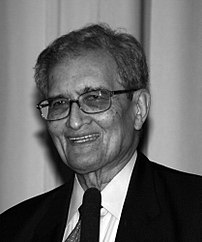 Image via WikipediaAmartya Sen wrote in the Little Mag:
Image via WikipediaAmartya Sen wrote in the Little Mag:
It is not difficult to see that the economic predicament of the poor across the world cannot be reversed by withholding from them the great advantages of contemporary technology, the well-established efficiency of international trade and exchange, and the social as well as economic merits of living in open rather than closed societies. People from very deprived countries clamor for the fruits of modern technology (such as the use of newly invented medicines, for example for treating AIDS); they seek greater access to the markets in the richer countries for a wide variety of commodities, from sugar to textiles; and they want more voice and attention from the rest of the world. If there is skepticism of the results of globalization, it is not because suffering humanity wants to withdraw into its shell.
In fact, the pre-eminent practical issues include the possibility of making good use of the remarkable benefits of economic connections, technological progress and political opportunity in a way that pays adequate attention to the interests of the deprived and the underdog.[1] That is, I would argue, the constructive question that emerges from the anti-globalization movements. It is, ultimately, not a question of rubbishing global economic relations, but of making the benefits of globalization more fairly distributed.
via 3quarksdaily







0 komentar:
Posting Komentar